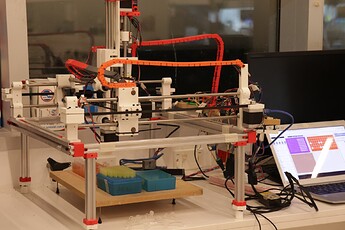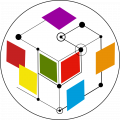Dear GOSH community!
We are looking for a person experienced on robotics, industrial design, mechanichal engineering or related disciplines, to work with us on making an OScH “liquid handling robot” for automating molecular biology protocols.
The collaboration will be funded by the GOSH Collaborative Development Fund (New Project Track; Phase 1).
Please feel free to share this call with potential applicants, baring in mind that the program requires that they have not been involved in OScH development before.
The tasks of the collaboration, requisites for applicants, and budget are outlined below.
To apply, please reply to this post or send us an email.
To learn more about the project, please visit:
- Our post in GOSH’s projects category.
- The application to GOSH’s collaborative development program.
- The repositories at GitLab.
- Or have a look the overview videos.
Current prototype
Cheers!
@naikymen @gcorthey @mgamba and Vane.
Tasks
Project tasks:
- Adapt (or design) one open source tool-changing mechanism to our liquid handling CNC machine, enabling it to exchange different pipettes during a protocol.
- Design an enclosure for electronics that must protect the components, be aesthetically pleasing, and not hinder general usage.
- Assess overall structure and usability of the machine and suggest improvements.
Expected design practices: modularity, repairability, adaptability and transparency.
Required documentation practices:
- Lead documentation efforts relevant to design and construction, and improve existing documentation.
- Help provide all files/specifications to local manufacturers required for production and assembly.
General requirements
Applicants must:
- Be able to carry out the tasks using the available budget (read on for details).
- Follow the GOSH code of conduct and ethos, align to the GOSH Manifesto, and comply with the terms of the collaborative development program.
- Prepare progress reports for weekly meetings.
- Provide all design files, procedures, and other documentation in an open format.
- Be able to receive payments by:
- Credit card (to organizations only, not individuals).
- PayPal (individuals only).
- Local wire transfer (to Argentinian accounts only, in either ARS or USD).
- Be able to produce fiscally valid invoices and receipts.
Note: The collaboration can be entirely remote; applicants from all eligible countries are welcome.
Required skills
We require collaborators to have:
- Proficiency in CAD design (preferably using free tools: FreeCAD, OpenSCAD, etc.).
- Proficiency in preparing models and schematics for production, in at least the following manufacturing methods: 3D printing, metal and plastic CNC milling, and engraving.
We will appreciate (but not require):
- Familiarity or experience with the project’s main hardware components:
- General electronics of CNC machines (control electronics, “power” electronics, homing/calibration procedures).
- General mechanics and structure of CNC machines (transmission systems, factors affecting precision and structural rigidity, etc.).
- Basic physics of liquid handling (notions on pressure, surface tension, etc.).
- Knowledge on firmware and hardware for CNC machines.
- Experience on interfacing with machine controllers through programming (in Python, preferably).
Budget, applications and selection procedure
The maximum budget for this collaboration is 700 USD, that can be increased if appropriately justified (note: the amount is for working hours only, manufacturing costs and materials will be covered separately).
Candidates satisfying the criteria above are welcome to apply for the collaboration!
To apply:
- Please share with us your contact information.
- We will then find a time for an interview, to share further details on the tasks and hear about your experience.
- Finally we will ask you to prepare:
- A list of actions for each task, and the time each action will take.
- A budget for materials (BOM) and manufacturing costs.
Acknowledgements
We thank the Gathering for Open Science Hardware (http://openhardware.science) and the Alfred P. Sloan Foundation (https://sloan.org) for their support.

We thank reGOSH for bringing us together, making the project possible.

